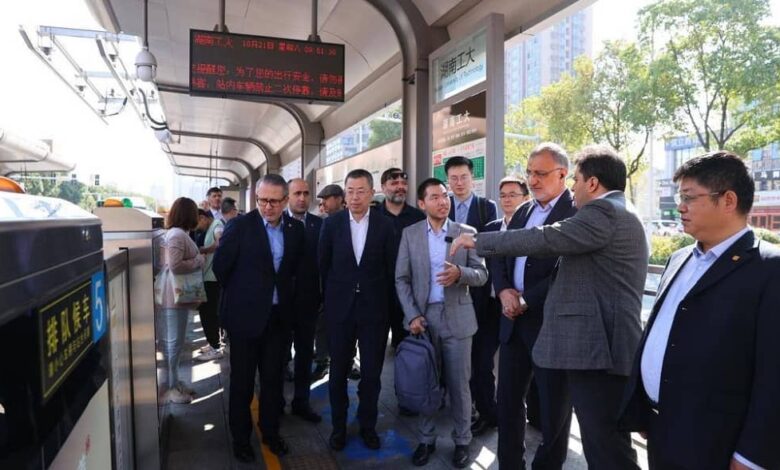Iranian Regime’s Shadowy Deals with China Highlight Corruption and Sanctions Evasion

Written by
Shahriar Kia
The clerical regime in Iran has come under intense scrutiny for its secretive multi-million-euro contracts with Chinese companies, raising concerns about corruption and lack of transparency. Despite the regime’s FATF blacklisting and international sanctions, which have cut Tehran off from the global financial system, the Iranian regime is finding ways to channel funds to Chinese firms through elaborate barter arrangements.
The controversy began with the revelation of a secretive two-billion-euro contract between the Tehran City Council and a Chinese construction company for the purchase of electric buses. The head of the council, Mehdi Chamran, defended the agreement, claiming that the details were “confidential and its disclosure poses a security issue.” However, the contract has even been criticized by city council members for its opacity and relevance.
Other contentious contracts include a 400-million-euro agreement for “smart equipment and traffic control cameras” from a Chinese firm, raising alarms about potential security risks due to giving foreign companies access to “sensitive data.” This equipment is most likely to be used for increased surveillance of Iranian citizens, particularly political dissidents.
#Iran News in Brief
In a recent wave of oppressive actions by the regime, Ahmadreza Radan, the Commander-in-Chief of State Security Forces, announced that a plan is being implemented to deal with #women’s dress code using surveillance cameras and #AI.https://t.co/qdaY0w4aYb pic.twitter.com/SxfwCbUaFm— NCRI-FAC (@iran_policy) June 17, 2023
The planned purchase of 150,000 electric motorcycles and 27,500 new taxis, worth 225 million euros each, from the automaker GAC Aion, has also been criticized for not following a conventional tendering process. These deals highlight the regime’s preference for secretive agreements with Chinese firms to avoid international scrutiny and punishment.
The involvement of various Iranian government agencies in the approval process, including the regime’s president Ebrahim Raisi, the ministries of industries, foreign affairs, interior, and oil, as well as the Central Bank, suggests a state-wide decision-making process. This further indicates that permission for the whole project was granted by the office of Supreme Leader Ali Khamenei, as the Tehran city government does not have access to such a large amount of hard currency.
According to an editorial in Tehran Municipality’s Hamshahri newspaper, the regime’s strategy of utilizing foreign currency resources available in China is deeply influenced by the overarching impact of international sanctions on Iran. With the country’s access to the global financial system severely restricted, the regime has turned to barter arrangements with China to finance these deals.
#Iran News in Brief
According to a former official, since the regime in Iran has been put on the #MoneyLaundering blacklist of @FATFNews, countries like China, Iraq, Pakistan and Afghanistan refuse any banking and financial cooperation with Tehran.https://t.co/2HTl8vGRIw pic.twitter.com/NtMdqUT40x— NCRI-FAC (@iran_policy) January 2, 2023
The regime’s dependence on Chinese firms is driven by the necessity to utilize foreign currency resources available in China, as Tehran is unable to receive money directly due to the FATF blacklisting and international sanctions. By bartering oil exports for the necessary funds, the clerical regime is able to finance these opaque contracts, which serve to line the pockets of its inner circle while further oppressing the Iranian people.
Corruption has been a long-standing challenge in Iran, with the country ranking 147th out of 180 countries in Transparency International’s 2022 Corruption Perception Index. The regime’s elite continues to enrich itself through these shadowy deals, while the Iranian people suffer from the economic consequences of sanctions, systemic corruption, and mismanagement.
The clandestine agreements with China underscore the regime’s persistent endeavors to evade international sanctions and divert funds to its loyalists. Through trading oil exports for essential finances, the clerical regime sustains these murky transactions, ultimately enriching its inner circle at the expense of further suppressing the Iranian populace. The absence of transparency, the complicity of top-ranking officials, and the utilization of oil revenues to fuel these agreements all underscore the urgent need to pinpoint and close any loopholes in the international sanctions framework, thereby severing the regime’s crucial lifelines.
Iranian Regime’s Shadowy Deals with China Highlight Corruption and Sanctions Evasion

